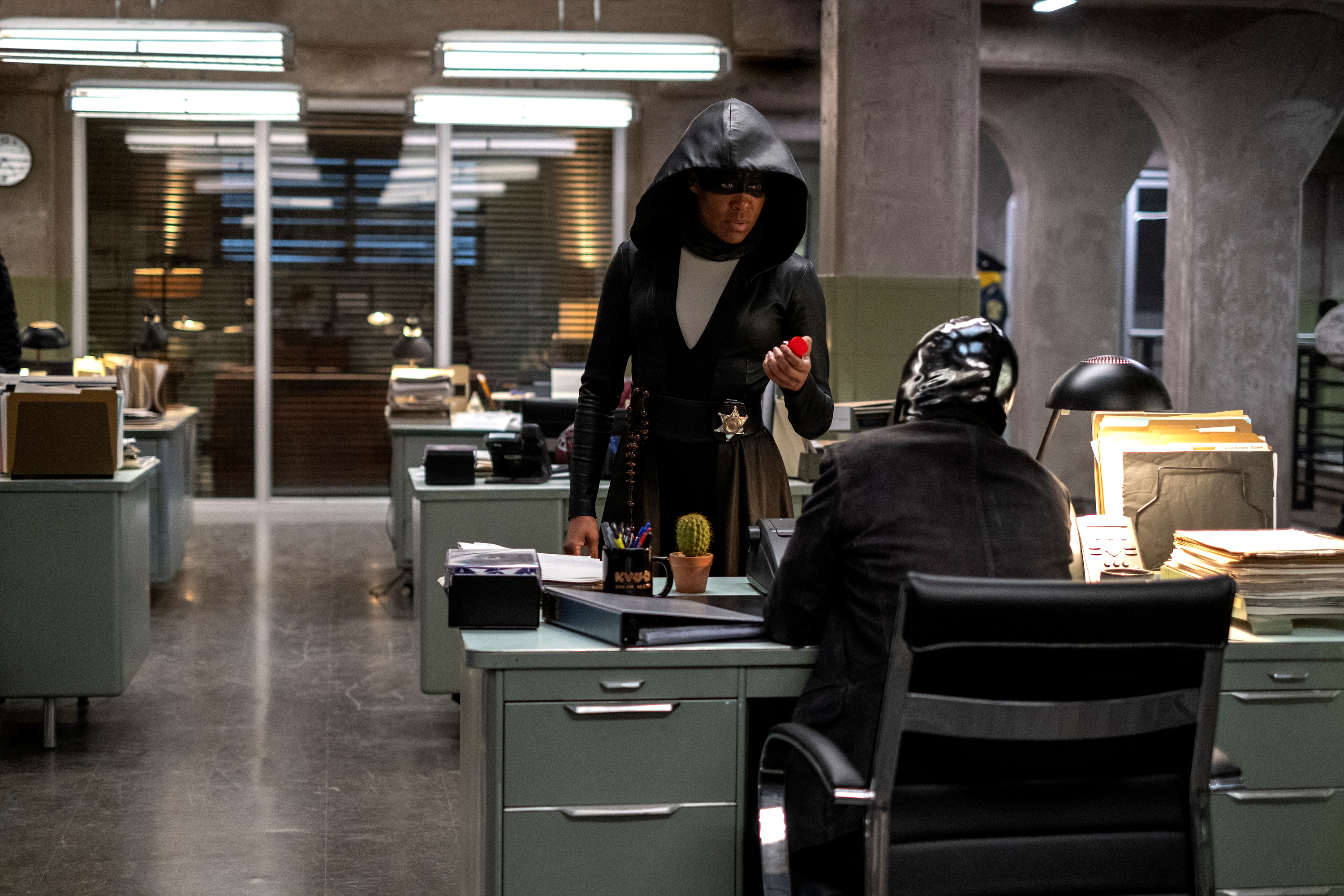She's a woman. She's a superhero. Get over it.
The understated genius of Watchmen's female superheroes


A free daily email with the biggest news stories of the day – and the best features from TheWeek.com
You are now subscribed
Your newsletter sign-up was successful
During a pivotal moment in episode four of Watchmen, three characters who are arguably out of central casting for any comic book adaptation — the brooding masked avenger, the jaded yet noble FBI agent, and the eccentric trillionaire genius with mysterious motives — gather to discuss a key development in the case that the masked avenger and the FBI agent are working (separately, of course, though they'd do far more good working together) and that the genius clearly knows more about than they're letting on. The scene is paradoxically remarkable for its seeming banality: Each of these characters is a woman. Two of them are women of color. One of them is nearly 70 years old — though all three of them are at least 40. The rarity of seeing women — let alone women over 35, and let alone women of color — as co-leads on any series, especially a many-chambered puzzle-box of a superhero thriller, makes Watchmen downright radical. Yet the show never calls attention to its approach to gender, it just allows these women to be exactly who they are — which may be the most radical element of all.
These women — Angela Abar, aka Sister Night (Regina King), Laurie Blake (Jean Smart), and Lady Trieu (Hong Chau) — form a triumvirate that will propel showrunner Damon Lindelof's intense, operatic story of trauma and justice, love and vengeance, violence and redemption. The series is more openly preoccupied with questions of race in America, particularly the vicious insidiousness of white supremacy and the heroic tenacity required to survive, let alone thwart, it. Still, it does powerful — if subtler — work with gender, in ways that aren't just unique for primetime, premium cable, but in how women can lead superhero franchises.
Watchmen arrives at a time when films like Wonder Woman and Captain Marvel and shows like Jessica Jones and Supergirl have put an unabashedly feminist spin on the superhero genre, using the cover of popcorn crowd-pleasers and hardboiled noir to talk, quite explicitly, about what it's like to be a woman. Jessica Jones and Captain Marvel each use the mind-erase trope, with varying degrees of darkness, to metaphorize abusive relationships and gaslighting. Wonder Woman and Supergirl may be lighter in tone, but these stories also position their heroines as young women who must embrace their literal powers to overcome this hostile world. These stories simultaneously provide valuable frameworks for discussing the pain of being a woman while offering moments of breathtaking catharsis and fantasies of transcending that pain: Women wept over the "No Man's Land" sequence in Wonder Woman and turned "I have nothing to prove to you," the quip that Carol Danvers makes when she sonic blasts her chief gaslighter square in the gut, into a rallying cry against the "debate me" dudebros online. Of course, we need stories that starkly portray the realities of modern womanhood, that offer a loud and proudly feminist response to those realities.
The Week
Escape your echo chamber. Get the facts behind the news, plus analysis from multiple perspectives.

Sign up for The Week's Free Newsletters
From our morning news briefing to a weekly Good News Newsletter, get the best of The Week delivered directly to your inbox.
From our morning news briefing to a weekly Good News Newsletter, get the best of The Week delivered directly to your inbox.
Still, there's something refreshing, and perhaps equally feminist, in Watchmen's way of creating fully realized women characters and letting them engage with the world just as any fully realized male character would. Lady Trieu, for instance, doesn't have to be a woman to retain the veneer of ethical nebulousness that makes her so compelling; she happens to be a woman who is as inscrutably ruthless as, say, Adrian Veidt, the show's erstwhile eccentric trillionaire genius, whose company she now owns. Though she is very much her own person, with her own history of generational trauma, the fact that she can so easily slip into the Veidt archetype suggests that this archetype doesn't have to be — indeed, should not be — masculine by default.
But when Watchmen engages directly with gender, it offers a vital corrective to the failings of its source material: In the original graphic novel, young Laurie is almost exclusively defined by her relationships with, and reactions to, the more serious, sober-minded male leads, like her lovers, Dan Dreiberg (Nite Owl II) and Dr. Manhattan; her former teammate, Ozymandias; and father, Eddie Blake, aka The Comedian. Watchmen presents Laurie Blake as a hyper-competent, extremely over-it FBI agent, a notable contrast from her naïf persona in the book. The series' third episode allows Laurie to sardonically riff on her past relationships via an extended joke about three heroes and a young girl, a bricklayer's daughter, who meet God — the punchline is that the three heroes each end up damned to Hell by their hubris, and the young girl, the one nobody suspected, the one nobody thought much about at all, is the one to take out God Himself with one carefully tossed brick. Laurie gets to re-frame her erasure as the prelude to, if not her triumph, then her endurance, her survival.
The most poignant plot arc unquestionably belongs to Angela, the central cog in this pocket watch of a series as it ticks down to its finale: She's vested with all the supercool superhero tropes — a baroquely tormented childhood/origin story; a sweet, yet sort of nondescript (well, initially, at first) love interest; a secret identity and a badass subterranean lair; an unknown family member and hidden past that slowly reveals itself to her; and a formidable prowess with martial arts and firearms. She could easily be Batman or John Wick — heroes whose stories aren't explicitly centered on their gender. Angela's arc, which entails learning about her grandfather's history to uncover a vast white supremacist conspiracy at the highest levels of government, could arguably be reconfigured to suit a male lead — a point that the show underscores by paralleling her story as Sister Night with her grandfather's story as Hooded Justice, the first costumed vigilante in American history.
Even the revelation that Cal Abar (Yahya Abdul-Mateen II), Angela's husband, is Dr. Manhattan, the indigo-skinned ubermensch from Alan Moore's and Dave Gibbons' comic universe has not eclipsed Angela's hold over the narrative. Angela is wry and tough, hard-headed and more tender-hearted than she'd care to admit; we know her so fully, and we've seen her serve as her husband's protector (during the White Night attack on their home, she pushes him out of blast range before dispatching one of the shotgun-wielding Seventh Kalvary). As a result, the disclosure about Cal being Dr. Manhattan actually makes him, the most powerful being in the universe, seem more like her equal. If anything, the late stage reveal that the Kalvary's grand plan is to kidnap Dr. Manhattan and siphon his powers to their leader effectively "damsels" him. He tells her that this moment, where she straps on a tactical vest and removes two guns from their hiding space behind a centerpiece on their wall, becoming a one-woman army in her live wire desire to save him, is when he truly knows he loves her.
A free daily email with the biggest news stories of the day – and the best features from TheWeek.com
As Watchmen maneuvers into its season finale, the only being standing between a white supremacist Armageddon and life as we know it is Angela Abar. She's fighting for her lover, and for the free world — and while that fight is deeply personal, it's still personal in a collective way; it's a fight that countless heroes have waged across ancient myths and modern-day CGI smash 'em ups alike. There's something profound about seeing a strong female protagonist who doesn't have to be a Strong Female Protagonist™: Watchmen shows that a woman can be the center of a story that isn't necessarily centered on the experience of being a woman; it allows women to be integral to the plot without calling attention to how spectacular or unique that is — because it shouldn't be spectacular, or unique. It should be common.
Laura Bogart is a featured writer for Salon and a regular contributor to DAME magazine. Her work has appeared in The Atlantic, CityLab, The Guardian, SPIN, Complex, IndieWire, GOOD, and Refinery29, among other publications. Her first novel, Don't You Know That I Love You?, is forthcoming from Dzanc.
-
 What are the best investments for beginners?
What are the best investments for beginners?The Explainer Stocks and ETFs and bonds, oh my
-
 What to know before filing your own taxes for the first time
What to know before filing your own taxes for the first timethe explainer Tackle this financial milestone with confidence
-
 The biggest box office flops of the 21st century
The biggest box office flops of the 21st centuryin depth Unnecessary remakes and turgid, expensive CGI-fests highlight this list of these most notorious box-office losers
-
 Walter Isaacson's 'Elon Musk' can 'scarcely contain its subject'
Walter Isaacson's 'Elon Musk' can 'scarcely contain its subject'The latest biography on the elusive tech mogul is causing a stir among critics
-
 Welcome to the new TheWeek.com!
Welcome to the new TheWeek.com!The Explainer Please allow us to reintroduce ourselves
-
 The Oscars finale was a heartless disaster
The Oscars finale was a heartless disasterThe Explainer A calculated attempt at emotional manipulation goes very wrong
-
 Most awkward awards show ever?
Most awkward awards show ever?The Explainer The best, worst, and most shocking moments from a chaotic Golden Globes
-
 The possible silver lining to the Warner Bros. deal
The possible silver lining to the Warner Bros. dealThe Explainer Could what's terrible for theaters be good for creators?
-
 Jeffrey Wright is the new 'narrator voice'
Jeffrey Wright is the new 'narrator voice'The Explainer Move over, Sam Elliott and Morgan Freeman
-
 This week's literary events are the biggest award shows of 2020
This week's literary events are the biggest award shows of 2020feature So long, Oscar. Hello, Booker.
-
 What She Dies Tomorrow can teach us about our unshakable obsession with mortality
What She Dies Tomorrow can teach us about our unshakable obsession with mortalityThe Explainer This film isn't about the pandemic. But it can help viewers confront their fears about death.
